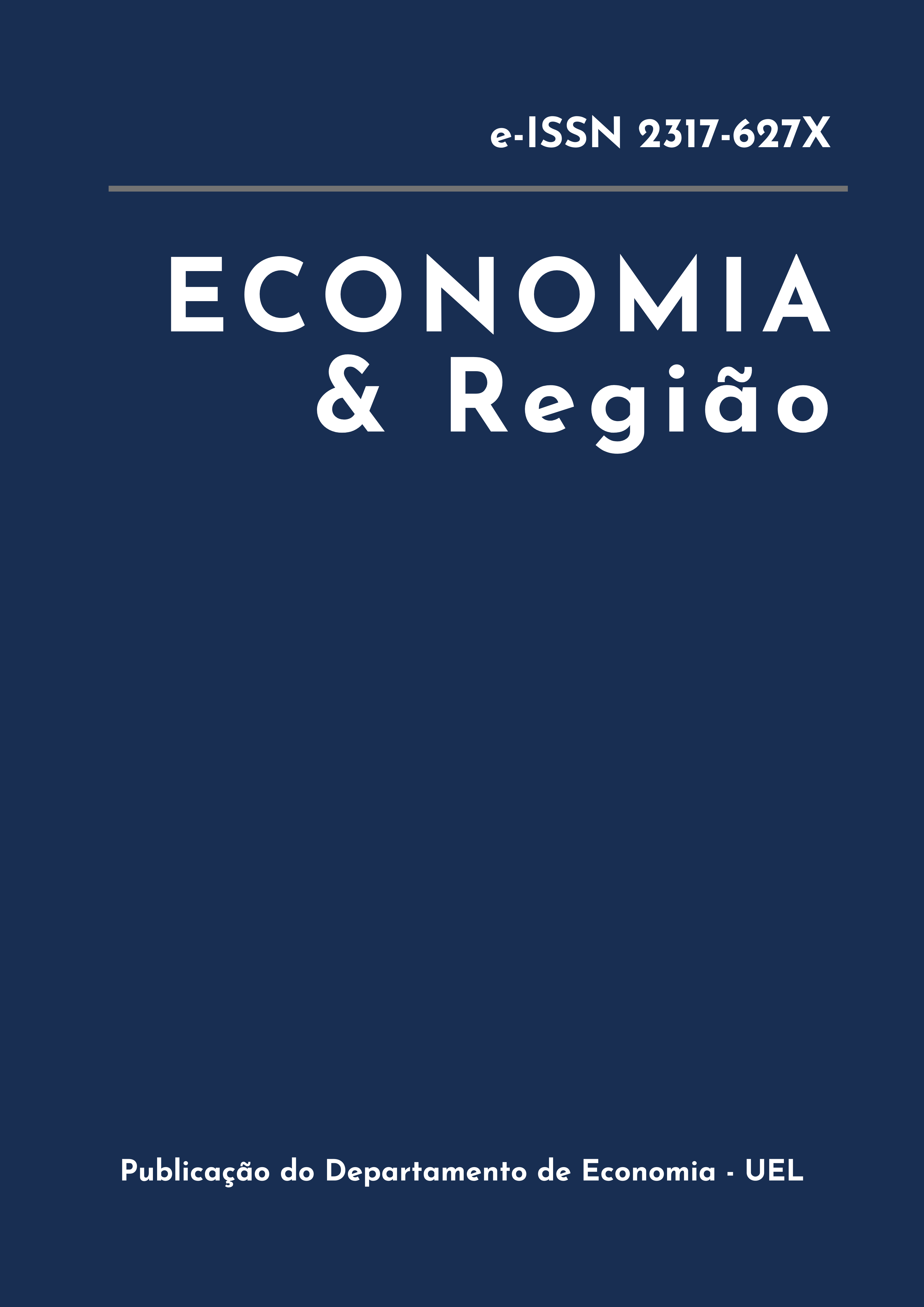Brazilian Inequality and Trade Liberalization between Brazil and China and between Brazil and United States
DOI:
https://doi.org/10.5433/2317-627X.2024.v12.n2.48647Keywords:
Trade liberalization, Income Inequality, PAEGAbstract
This study evaluated the possible effects of a trade liberalization agreement between Brazil and the United States (US), and between Brazil and China on inequality in income, welfare, and consumption of Brazilian households. We used the General Equilibrium Analysis Project (PAEG), a model of the Brazilian economy that divides the country into five macro-regions and categorizes households into ten income groups by region. The findings suggest that eliminating trade tariffs between the US and Brazil tends to decrease income inequalities in underdeveloped regions while increasing them in developed regions. Similarly, eliminating trade tariffs between China and Brazil tends to amplify income inequalities in underdeveloped regions and alleviate them in developed regions. Moreover, Brazilian households experience greater gains in welfare and consumption as a result of the removal of trade tariffs between China and Brazil.This study contributes to the ongoing debate on the relationship between trade liberalization and inequality in Brazil.
Downloads
References
ABOUBACARI, A.; WOLF, R.; TROTTER, I. M.; MATTOS, L. B. Impact d’une possible libéralisation commerciale entre le Brésil, les États-Unis, l’Union Européenne et la Chine sur l’économie brésilienne: une analyse d’équilibre général calculable. Brazilian Journal of International Relations, Marília, v. 9, n. 2, p. 254-271, 2020. DOI 10.36311/2237-7743.2020. DOI: https://doi.org/10.36311/2237-7743.2020.v9n2.p254-271
ALVAREDO, F.; CHANCEL, L.; PIKETTY, T.; SAEZ, E.; ZUCMAN, G. World inequality report 2018. Cambridge: Harvard University Press, 2018. DOI: https://doi.org/10.4159/9780674984769. DOI: https://doi.org/10.4159/9780674984769
ARBACHE, J. S. Wage differentials in Brazil: theory and evidence. Journal of Development Studies, London, v. 38, n. 2, p. 109-130, 2001. DOI: https://doi.org/10.1080/00220380412331322281. DOI: https://doi.org/10.1080/00220380412331322281
ATTANASIO, O.; GOLDBERG, P. K.; PAVCNIK, N. Trade reforms and wage inequality in Colombia. Journal of Development Economics, Amsterdam, v. 74, n. 2, p. 331-366, 2004. Available in: https://econpapers.repec.org/scripts/redir.pf?u=http%3A%2F%2Fwww.sciencedirect.com%2Fscience%2Farticle%2Fpii%2FS0304-3878%2804%2900018-5;h=repec:eee:deveco:v:74:y:2004:i:2:p:331-366. Access in: 1 nov. 2023.
AUTOR, D.; DORN, D.; HANSON, G. When work disappears: manufacturing decline and the falling marriage market value of young men. American Economic Review, Pittsburgh, v. 1, n. 2, p. 161-178, 2019. DOI: https://doi.org/10.1257/aeri.20180010. DOI: https://doi.org/10.1257/aeri.20180010
BORCHERT, I.; YOTO, V. Y. Distance, globalization, and international trade. Economics Letters, Amsterdã, v. 153, p. 32-38, apr. 2017. DOI: https://doi.org/10.1016/j.econlet.2017.01.023. DOI: https://doi.org/10.1016/j.econlet.2017.01.023
BUENO, E. U.; FEIJÓ, F. T. A entrada da Venezuela no mercosul: uma análise de equilíbrio geral computável sobre os impactos setoriais no Brasil. Pesquisa e Planejamento Econômico, Rio de Janeiro, v. 44, n. 1, p. 169-212, apr. 2014. Available in: http://hdl.handle.net/10183/256208. Access in: 1 nov. 2023.
CASTILHO, M.; MENÉNDEZ, M.; SZTULMAN, A. Trade liberalization, inequality, and poverty in Brazilian states. World Development, Amsterdã, v. 40, n. 4, p. 821-835, apr. 2012. DOI: https://doi.org/10.1016/j.worlddev.2011.09.018. DOI: https://doi.org/10.1016/j.worlddev.2011.09.018
CHAKRABARTI, A. Does trade cause inequality?. Journal of Economic Development, Seoul, v. 25, n. 2, p. 1-22, 2000. Available in: https://scholar.google.com/scholar?hl=pt-br&as_sdt=0%2c5&q=chakrabarti%2c+avik+et+al.+%282000%29%2c+“does+trade+cause+inequality%3f”+in%3a+journal+of+economic+development%2c+25%282%29%2c+daejeon%2c+korea%2c+pp.+1–22.+&btng=. Access in: 1 nov. 2023.
CHEN, J.; DABO, C.; AIPING, Y. Trade development between China and countries along the belt and road: a spatial econometric analysis based on trade competitiveness and complementarity. Pacific Economic Review, Hoboken, v. 25, p. 205-227, jun. 2020. DOI: https://doi.org/10.1111/1468-0106.12329. DOI: https://doi.org/10.1111/1468-0106.12329
CHIMILILA, C.; SABUNI, C.; AMOS, B. Trade facilitation in EAC customs union: its achievement and implementation in Tanzania. Journal of Economics and Sustainable Development, [s.l.], v. 5, n. 25, p. 1-14, 2014. Available in: https://www.iiste.org/Journals/index.php/JEDS/article/view/17522. Access in: 1 nov. 2023.
DAUMAL, M. The impact of trade openness on regional inequality: the cases of India and Brazil. The International Trade Journal, Abingdon, v. 27, n. 3, p. 243-280, 2013. DOI: https://doi.org/10.1080/08853908.2013.796839. DOI: https://doi.org/10.1080/08853908.2013.796839
TOLIPAN, R.; TINELLI, A. C. A controvérsia sobre distribuição da renda e desenvolvimento. Rio de Janeiro: Zahar, 1975.
PORTO, P. C. S.; CANUTO, O.; MORINI, C. The impacts of trade facilitation measures on international trade flows. Washington, DC: The World Bank, 2015.
EDWARDS, S. Trade policy, growth, and income distribution. American Economic Review, Pittsburgh, v. 87, n. 2, p. 205-210, may 1997. Avalaible in: https://www.jstor.org/stable/2950914. Access in: 1 nov. 2023.
EZCURRA, R.; RODRÍGUEZ-POSE, A. Does economic globalization affect regional inequality?: a cross-country analysis. World Development, Amsterdan, v. 52, p. 92-103, 2013. DOI: https://doi.org/10.1016/j.worlddev.2013.07.00. DOI: https://doi.org/10.1016/j.worlddev.2013.07.002
FERREIRA, A. Convergence in Brazil: recent trends and long-run prospects. Applied Economics, Abingdon, v. 32, n. 4, p. 479-489, 2000. DOI: https://doi.org/10.1080/000368400322642. DOI: https://doi.org/10.1080/000368400322642
FERREIRA, F. H. G.; WALTON, M. World development report 2006: equity and development. Washington, DC: World Bank, 2005. v. 28. DOI 10.1596/978-0-8213-6249-5.
FISHLOW, A. Brazilian size distribution of income. American Economic Review, Pittsburgh, v. 62, n. 1/2, p. 391-402, 1972. Avalaible in: https://www.jstor.org/stable/1821573. Access in: 1 nov. 2023.
FRANKEL, J. A.; ROMER, D. H. Does trade cause growth?. American Economic Review, Pittsburgh, v. 89, n. 3, p. 379-399, 1999. DOI 10.1257/Aer.89.3.379. DOI: https://doi.org/10.1257/aer.89.3.379
GOÑI, E.; LÓPEZ, J. H.; SERVÉN, L. Fiscal redistribution and income inequality in Latin America. World Development, Amsterdã, v. 39, n. 9, sep. 2011. DOI: https://doi.org/10.1016/j.worlddev.2011.04.025. DOI: https://doi.org/10.1016/j.worlddev.2011.04.025
GÓES, C.; KARPOWICZ, I. Inequality in Brazil: a closer look at the evolution in states. In: SPILIMBERGO, A.; SRINIVASAN, K. Brazil: boom, bust, and the road to recovery. Washington, DC: International Monetary Fund, 2019. p. 127-137.
GURGEL, A. C.; PEREIRA, M. W. G.; TEIXEIRA, E. C. PAEG: a estrutura do PAEG. Viçosa: Universidade Federal de Viçosa, 2013. Avalaible in: http://arquivo.ufv.br/der/paeg/technical%20paper%20n.1_06dez2011.pdf. Access in: 1 nov. 2023.
HAP, S. Trade liberalization and social welfare: evidence from Cambodia. 2013. Thesis (Doctorate in Policy Studies) − National Graduate Institute for Policy Studies, Tokyo, 2013. DOI 10.13140/RG.2.1.2380.4325.
HAMMAD, S. Brazil: current trade patterns with China threaten the promise of re-industrialization. BNP Paribas, Paris, 5 apr. 2023. Available in: https://economic-research.bnpparibas.com/pdf/en-us/brazil-current-trade-patterns-china-threaten-promise-industrialization-4/5/2023,48437. Access in: 1 nov. 2023.
UNITED STATES OF AMERICA. Office of The United States Trade Representative. Countries and regions: Western Hemisphere, Brazil. USTR, Washington, DC, 2023. Available in: https://ustr.gov/countries-regions/americas/brazil. Access in: 16 mar. 2023.
HOEKMAN, B.; NICITA, A. Trade policy, trade costs, and developing country trade. World Development, Amsterdã, v. 39, n. 12, p. 2069-2079, 2011. DOI: https://doi.org/10.1016/j.worlddev.2011.05.013. DOI: https://doi.org/10.1016/j.worlddev.2011.05.013
HORRIDGE, M.; SOUZA, J. B. Would trade liberalization help the poor of Brazil?. World Bank, Washington, DC, n. 106, jun. 2009. Avalaible in: http://hdl.handle.net/10986/28171license:ccby30igo. Access in: 1 nov. 2023.
KAHAI, S. K.; SIMMONS, W. The impact of globalisation on income inequality. Global Business and Economics Review, Genebra, v. 7, n. 1, p. 1-15, apr. 2005. DOI: https://doi.org/10.1504/gber.2005.006915. DOI: https://doi.org/10.1504/GBER.2005.006915
LANGONI, C. G. Distribuição da renda e desenvolvimento econômico no Brasil: uma afirmação. Estudos Econômicos, São Paulo, v. 8, n. 38, p. 5-88, oct. 1974. Avalaible in: https://www.revistas.usp.br/ee/article/view/143252/137981. Access in: 1 nov. 2023.
MENEZES FILHO, N. A.; RODRIGUES JR., M. Openness, technology and skills: evidence from the Brazilian manufacturing. In: WORKSHOP ON TRADE LIBERALIZATION AND THE LABOR MARKET IN BRAZIL, 2001, Brasília, DF. Proceedings [...]. Brasília, DF: Universidade de Brasília: IPEA, 2001.
NERI, M. C.; SOUZA, P. H. G. F. A década inclusiva (2001-2011): desigualdade, pobreza e políticas de renda. Brasília, DF: IPEA, 2012.
PEARSON, K. R.; PARMENTER, B. R.; POWELL, A. A.; WILCOXEN, P. J.; DIXON, P. B. Notes and problems in applied general equilibrium economics. Haarlem: North Holland, 2014.
RODRIGUEZ, F.; RODRIK, D. Trade policy and economic growth: a sceptic’s guide to the cross-national evidence. NBER Macroeconomics Annual, Chicago, v. 15, p. 261-325, 2000. DOI: https://www.journals.uchicago.edu/doi/pdf/10.1086/654419. DOI: https://doi.org/10.1086/654419
RIBEIRO, G. L. Outras globalizações: cosmopolíticas pós-imperialistas. Rio de Janeiro: EDUERJ, 2014.
RUTHERFORD, T. F. Extension of GAMS for complementarity problems arising in applied economic analysis. Journal of Economic Dynamics and Control, Amsterdam, v. 19, n. 8, p. 1299-1324, 1995. DOI: https://doi.org/10.1016/0165-1889(94)00831-2. DOI: https://doi.org/10.1016/0165-1889(94)00831-2
RUTHERFORD, T. F.; PALTSEV, S. V. Gtapingams and GTAP-EG: global datasets for economic research and illustrative models. Boulder: University of Colorado, 2000.
SACCONATO, A. L.; MENEZES FILHO, N. A diferença salarial entre os trabalhadores americanos e brasileiros: uma análise com micro dados. In: ENCONTRO NACIONAL DE ECONOMIA, 29., 2001, Niterói. Anais [...]. Niterói: ANPEC, 2001. Avalaible in: https://www.researchgate.net/profile/naercio-menezes-filho/publication/4730064_a_diferenca_salarial_entre_os_trabalhadores_americanos_e_brasileiros_uma_analise_com_micro_dados/links/56efd73908ae01ae3e70de40/a-diferenca-salarial-entre-os-trabalhadores-americanos-e-brasileiros-uma-analise-com-micro-dados.pdf. Access in: 1 nov. 2023.
SILVEIRA NETO, R. D. M.; AZZONI, C. R. Non-spatial government policies and regional income inequality in Brazil. Regional Studies, Abingdon, v. 45, n. 4, p. 453-461, 2011. DOI: https://doi.org/10.1080/00343400903241485 DOI: https://doi.org/10.1080/00343400903241485
SKIDMORE, T. E. Policy issues Brazil’s persistent income inequality: lessons from history. Latin American Politics and Society, Cambridge, v. 46, n. 2, p. 133-150, 2004. DOI: https://doi.org/10.1111/j.1548-2456.2004.tb00278.x DOI: https://doi.org/10.1111/j.1548-2456.2004.tb00278.x
TAYLOR, L.; BACHA, E. L.; CARDOSO, E. A.; LYSY, F. J. Models of growth and distribution for Brazil. Washington, DC: World Bank, 1980. Avalaible in: https://scholar.google.com/scholar?hl=pt-br&as_sdt=0%2c5&q=taylor%2c+lance+et+al.+%281980%29%2c+“models+of+growth+and+distribution+for+brazil”%2c+in%3a+world+bank+research+publication%2c+ibrd%2802%29%2ft2%2c+oxford+university+press%2c+c1980%2c+oxford%2c+england+xii%2c+355+p.&btng=. Access in: 1 nov. 2023.
YITZHAKI, S.; SCHECHTMAN, E. More than a dozen alternative ways of spelling Gini. in: Yitzhaki, S.; Schechtman, E., The Gini Methodology: A Primer on a Statistical Methodology. Springer New York, New York, NY. Springer Series in Statistics, 2013, pp. 11–31. DOI: https://doi.org/10.1007/978-1-4614-4720-7_2
ZHAO, S.; CHANG, T.; NI, Y.; ZHOU, P. An empirical study of trade in goods between China and Brazil: analysis of competitiveness and complementarity. Economies, Basel, v. 11, n. 9, p. 224, 2023. DOI: https://doi.org/10.3390/economies11090224 DOI: https://doi.org/10.3390/economies11090224
WINTERS, L. A. Trade liberalization and poverty: what are the links? World Economy, Hoboken, v. 25, n. 9, p. 1339-1367, 2002. DOI: https://doi.org/10.1111/1467-9701.00495 DOI: https://doi.org/10.1111/1467-9701.00495
WOLF, R.; TEIXEIRA, E. C.; PEREIRA, M. W.; GURGEL, A. C.; MARQUES, H. L. T. Effects of the bolsa família program on income and consumption in Brazilian macroregions. West Lafayette: Purdue University, 2018.
WOLF, R. Assessing the impacts of labour skill improvement in Bolsa Família Program beneficiaries: a computable general equilibrium model analysis. 2021. 164 f. Tese (Doutorado em Economia Aplicada) – Universidade Federal de Viçosa, Viçosa, 2021. Avalaible in: https://locus.ufv.br//handle/123456789/28807. Access in: 1 mar. 2023.
Downloads
Published
How to Cite
Issue
Section
License
Copyright (c) 2023 Abdoulaye Aboubacari Mohamed, Rayan Wolf, Sepúlveda, Michael

This work is licensed under a Creative Commons Attribution 4.0 International License.
Economia & Região adota a Licença Creative Commons Attribution CC-BY 4.0 International, portanto, os direitos autorais relativos aos artigos publicados são do(s) autor(es), que cedem à Revista Economia & Região o direito de exclusividade de primeira publicação.
Sob essa licença é possível: Compartilhar - copiar e redistribuir o material em qualquer suporte ou formato. Adaptar - remixar, transformar, e criar a partir do material, atribuindo o devido crédito e prover um link para a licença e indicar se mudanças foram feitas.

















